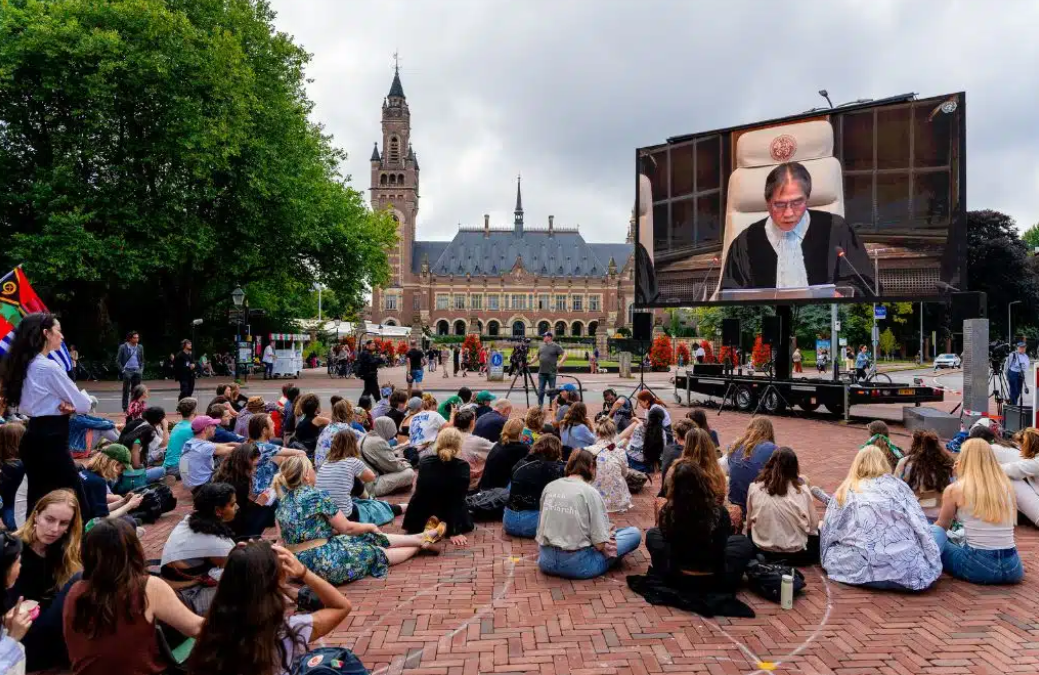
Hope, Dignity and Justice

The Psychological Power of the ICJ Advisory Opinion on Climate Change
What does justice mean when your home is disappearing?
For many young people, Indigenous communities, and climate-vulnerable states, climate protection is not just a political issue – it’s a question of survival. When the International Court of Justice (ICJ) released a landmark advisory opinion on July 23, 2025, it meant far more than a legal assessment. It was a moment of recognition, dignity, and hope.
This so-called “Advisory Opinion” is not legally binding, yet its normative and political power is enormous – and its psychological resonance is deep. Especially for young people, Indigenous communities, and states in the Global South, the opinion marks a symbolic and emotional turning point. It is more than legal analysis: it is validation, encouragement, and a collective source of hope.
Context: What is the ICJ Advisory Opinion?
The opinion originates from an initiative by the Republic of Vanuatu, which launched a global campaign in 2021 together with Pacific students from the Pacific Islands Students Fighting Climate Change (PISFCC). Eventually, over 130 countries supported a resolution by the UN General Assembly requesting the ICJ to provide legal clarity: Do states have a binding legal obligation to effectively address the climate crisis – especially in relation to protecting human rights and future generations?
The resulting opinion affirms this obligation in key areas. Although it does not impose immediate sanctions, it sets a powerful new standard – for court cases worldwide, national legislation, and international negotiations. And crucially: for our shared understanding of justice.
Why this opinion matters psychologically
1. Recognition of lived injustice
For Pacific states, Indigenous communities, and young people who have fought for climate justice over many years, this opinion is a public message: “We see you. You were right.”
Psychological research identifies recognition as a core social need. It validates the experience of loss, marginalization, and unequal responsibility, makes collective suffering visible, and affirms the dignity of those affected. In doing so, it strengthens resilience, belonging, and self-efficacy (Deci & Ryan, 2000; Honneth, 1992; Vollhardt, 2012).
🔎 Research shows: Perceived justice significantly influences trust, motivation, and mental wellbeing during crises – the feeling of being taken seriously can turn helplessness into agency (Pfister & Böhm, 2011).
2. Rights instead of charity
When climate action is no longer framed as a generous gesture but as a legal obligation under international law, it transforms how affected people see themselves. No longer petitioners, they become rights-holders. Psychologically, this shift enhances agency, dignity, and identity.
In many conversations with activists and policymakers in the Global South, we hear this effect clearly: “Now we have a legal foundation to stand on.” Having a right to climate protection changes everything – including inner posture.
🔎 Studies emphasize that such shifts in collective self-perception can accelerate political processes (Carleton et al., 2022).
3. Trust in international justice
For people in states often perceived as “too small,” “too poor,” or “too far away” from global power centers, international law can feel abstract or disconnected from local realities. This makes it all the more significant when a court ruling clearly states: Small nations and future generations also deserve protection.
The ICJ opinion sends a powerful message – international justice is possible, even if delayed. It helps rebuild trust in global institutions and shared norms. And this kind of trust is a psychological cornerstone for long-term resilience and social cohesion.
🔎 Kühne et al. (2022) show that perceived institutional fairness is a protective factor against climate-related mental distress – especially in high-risk regions.
4. Emotionale Mobilisierung für strukturellen Wandel
The ICJ opinion triggered a wave of emotion for many people: relief, hope, dignity – and also grief for the long-overdue recognition. These emotions are not “irrational” – they are psychologically vital. They mobilize. They create connection, orientation, and energy for transformation.
Psychological research shows that hope is not naïve optimism. It is a strategic mode of collective action. It arises when justice becomes tangible – and becomes a powerful driver for political change (Böhm et al., 2012; Thomas & Haynes, 2023).




What matters now
This opinion is not an end – it is a beginning. It marks a psychologically powerful turning point in the global climate justice movement. The key question now is: How do we use this moment?
-
Legally: by integrating the opinion into national and international legal frameworks
-
Politically: by grounding bold decisions in its normative legitimacy
-
Psychologically: by reinforcing this newly affirmed dignity and hope – through storytelling, education, strategy, and dialogue
At ClimateMind, we work at this intersection between global policy and lived human experience. We highlight what many political processes overlook: the psychological impact of justice, dignity, and visibility.
Through psychological analysis, storytelling formats, trainings, and dialogue processes, we support institutions and decision-makers in not just talking about climate justice – but making it emotionally powerful and socially effective.
From the field
In our workshops with climate activists, civil servants, and community leaders in Tuvalu, Vanuatu, and Dominica, one thing became clear again and again: The symbolic power of international rulings like the ICJ opinion gives people the strength to continue fighting for their right to a safe and dignified future.
Further Reading
-
Tritschoks, A. (2018). Rethinking Justice in International Environmental Negotiations: Toward a More Comprehensive Framework. International Negotiation, 23(3), 446-477.
-
Müller, M. M. (2011). Justice as a framework for the solution of environmental conflicts. In Justice and conflicts: Theoretical and empirical contributions (pp. 239-250). Berlin, Heidelberg: Springer Berlin Heidelberg.
-
Mattaini, M. A. (2023). Constructing global climate justice: the challenging role of behavior science. Behavior and Social Issues, 32(2), 560-582.
Additional Resources
-
🧠 Explore our offerings on climate psychology, communication, and justice
Trainings, advisory services, and dialogue formats for governments, business, and civil society -
💌 Get in touch
For customized workshops, keynote sessions, or strategy support
Want to go further?
ClimateMind supports international organizations, governments, and civil society actors in shaping climate justice in emotionally meaningful, culturally sensitive, and psychologically impactful ways – through strategy, education, and co-creation.


